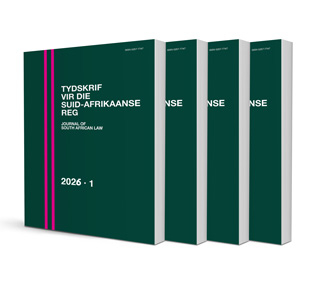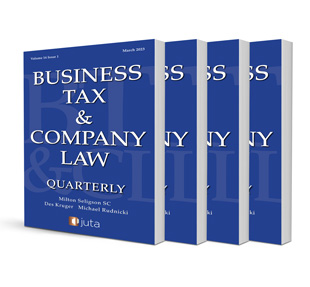Perfektering van ’n algemene notariële verband verleen géén vervreemdingsbevoegdhede aan die verbandreghebbende hetsy in daardie hoedanigheid óf as pandreghebbende nie – behalwe in dié hof

REGSPRAAK
Perfektering van ’n algemene notariële verband verleen géén vervreemdingsbevoegdhede aan die verbandreghebbende hetsy in daardie hoedanigheid óf as pandreghebbende nie – behalwe in dié hof
Authors: JC Sonnekus en EC Schlemmer
ISSN: 1996-2207
Affiliations: Universiteit van Johannesburg; Universiteit van Pretoria
Source: Tydskrif vir die Suid-Afrikaanse Reg, Issue 1, 2026, p. 173-185
https://doi.org/10.47348/TSAR/2026/i1a10
Abstract
The discussion examines the legal consequences of the perfection of a general notarial bond within South African law and critically assesses the judgment of Du Plessis AJ in Spar Group Ltd v Volemo Trading Enterprise (Pty) Ltd t/a Njhaka Njhaka Build It (2025 ZALMPPHC 194). South African authority, notably Cooper NO v Die Meester and Contract Forwarding (Pty) Ltd v Chesterfin (Pty) Ltd, firmly establishes that a general notarial bond does not confer a real right in the property described in the bond until it is perfected. Upon perfection – whether through consensual delivery or an order compelling specific performance – the bondholder acquires the status of a pledgee, with a limited real security right over the specific movable property of the debtor that has come into its possession.
Before perfection, the bondholder is merely a preferent creditor in respect of the debtor’s free residue as contemplated in section 102 of the Insolvency Act, and not a secured creditor. Perfection does not, however, vest in the pledgee any powers of ownership, management, or unilateral realisation. South African law prohibits parate executie in respect of notarial bonds and disallows any arrangement amounting to a pactum commissorium. A pledgee may therefore neither appropriate the pledged assets nor dispose of them for its own account without the intervention of a court. The only functionary legally empowered to realise and distribute an insolvent’s assets is the liquidator or trustee, acting in the interests of the body of creditors and subject to the concursus creditorum.
The focus then turns to the Spar Group’s credit arrangements with Volemo (in casu), secured by several general notarial “covering” bonds. It is doubted whether these instruments complied with section 51 of the Deeds Registries Act, particularly the requirement of a stated maximum amount where future indebtedness is to be secured.
The discussion of the court’s perfection order describes it as “unprecedented”. The order authorised the Spar Group not merely to take possession of Volemo’s movable assets, but to take control of the business, regulate the movement of stock (including stock possibly owned by third-party suppliers), operate the debtor’s bank accounts, collect book debts, transfer licences and permits, and dispose of assets while purportedly passing “valid title”. These powers far exceed those of a pledgee and directly conflict with the nemo plus iuris principle. No authority was cited for such far-reaching relief, (because none exists). The court appeared to rely on the fact that the debtor did not oppose the application, but it is contended that a failure to oppose cannot enlarge a creditor’s substantive rights nor derogate from the protections afforded to other creditors under the Insolvency Act, including the statutory provisions on impeachable dispositions.
The judgment is regarded as fundamentally flawed in doctrine and dangerously out of step with established principles of South African real security law. Yet, unless overturned on appeal, it remains binding on lower courts – a disquieting outcome given the serious legal errors it contains.
